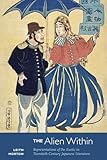The Alien Within : Representations of the Exotic in Twentieth-Century Japanese Literature / Leith Morton.
Material type: TextPublisher: Honolulu : University of Hawaii Press, [2009]Copyright date: ©2009Description: 1 online resource (272 p.)Content type:
TextPublisher: Honolulu : University of Hawaii Press, [2009]Copyright date: ©2009Description: 1 online resource (272 p.)Content type: - 9780824832926
- 9780824864576
- 830
- PL726.8
- online - DeGruyter
- Issued also in print.
| Item type | Current library | Call number | URL | Status | Notes | Barcode | |
|---|---|---|---|---|---|---|---|
 eBook
eBook
|
Biblioteca "Angelicum" Pont. Univ. S.Tommaso d'Aquino Nuvola online | online - DeGruyter (Browse shelf(Opens below)) | Online access | Not for loan (Accesso limitato) | Accesso per gli utenti autorizzati / Access for authorized users | (dgr)9780824864576 |
Frontmatter -- CONTENTS -- PREFACE -- INTRODUCTION -- CHAPTER 1. TRANSLATING THE ALIEN -- CHAPTER 2. NATURALIZING THE ALIEN -- CHAPTER 3. THE DEMON WITHIN -- CHAPTER 4. THE GOTHIC NOVEL -- CHAPTER 5. GOTHIC STYLISTICS -- CHAPTER 6. FEMALE SHAMANS -- CHAPTER 7. HISTORY / FICTION / IDENTITY -- CHAPTER 8. THE ALIEN WITHOUT -- EPILOGUE -- NOTES -- BIBLIOGRAPHY -- INDEX -- ABOUT THE AUTHOR
restricted access online access with authorization star
http://purl.org/coar/access_right/c_16ec
Readers worldwide have long been drawn to the foreign, the exotic, and the alien, even before Freud's famous essay on the uncanny in 1919. Given Japan's many years of relative isolation, followed by its multicultural empire, these themes seem particularly ripe for exploration and exploitation by Japanese writers. Their literary adventures have taken them inside Japan as well as outside, and how they internalized the exotic through the adoption of modernist techniques and subject matter forms the primary subject of this book. The Alien Within is the first book-length thematic study in English of the alien in modern Japanese literature and helps shed new light on a number of important authors. Morton examines the Gothic, a form of writing with strong affinities to European Gothic and a motif in the fiction of several key modern Japanese writers, such as Arishima Takeo. Morton also discusses the translations of Tsubouchi Shoyo, Japan's most famous early translator of Shakespeare, and how this most alien and exotic author was absorbed into the Japanese literary and theatrical tradition. The new field of translation theory and how it relates to translating Shakespeare are also discussed.Morton devotes two chapters to the celebrated female poet Yosano Akiko, whose verse on childbirth and her unborn children broke taboos relating to the expression of the female body and sensibility. He also highlights the writing of contemporary Okinawan novelist Oshiro Tatsuhiro, whose work springs from what is for Japanese an exotic subtropical landscape and makes symbolic reference to the otherness at the heart of Japanese religiosity. Another significant but equally overlooked subject is the focus of the final chapter, which analyzes the travel writing of internationally best-selling author Murakami Haruki. Murakami's great corpus of work includes a one-volume study of the 2000 Sydney Olympics, which Morton discusses in detail.The Alien Within breaks new ground in its treatment of the exotic in modern Japanese writing and in its discussion of authors and work hitherto absent from critical discussions in English. It will be of significant interest to readers of literature and students of modern Japanese culture and women's writing as well as those fascinated by the occult, Gothic fiction, and the exotic.
Issued also in print.
Mode of access: Internet via World Wide Web.
In English.
Description based on online resource; title from PDF title page (publisher's Web site, viewed 02. Mrz 2022)


